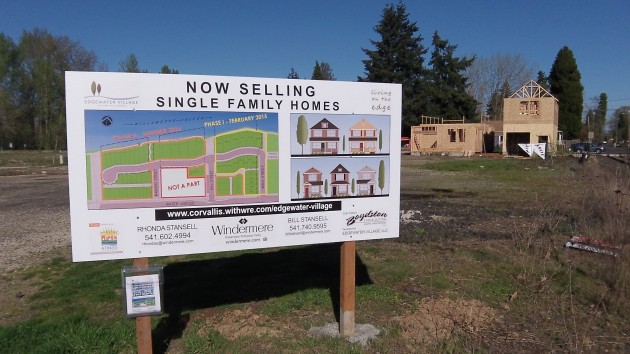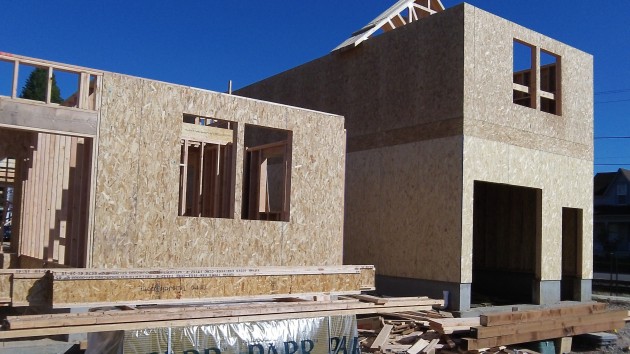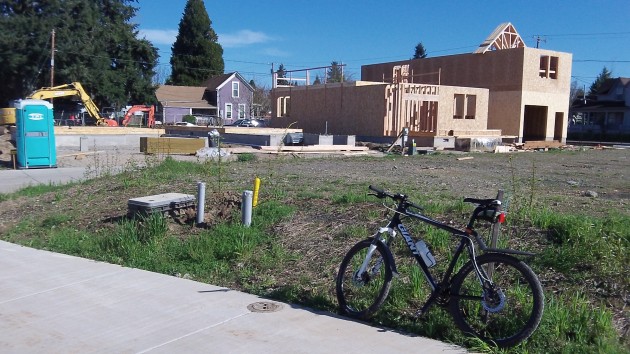It’s encouraging to see the first houses going up in Edgewater Village, the planned development sandwiched between Albany’s Water Avenue and the Willamette River. It signals the continuing transformation of an old part of Albany that had been a wasteland for some time even before the former packing plant on this site burned in 2006.
When I first moved to Albany in the 1970s, the plant packed corn and beans, if memory serves. Then it closed, was restarted by a company from Tennessee and shut down again in short order. Eventually it was converted to freezing seafood, which smelled bad but had the socially redeeming value of providing employment. That business folded too, and the plant sat idle and empty for a while until it burned it down.
The ruins sat there for a while longer until the city eventually recruited a potential developer and paid to have the site cleaned up, which meant crushing the concrete and piling the rubble up in impressive peaks. Riding by on my bike, I used to see kids climb those hills and slide down again, so the place had at least some use.
The planning for housing on the six-acre property went through several iterations that took years. Last year the plans were set and streets put in. And now, Eureka! Vertical construction! Five houses are being built, and the plans call for 55 more to be completed in stages over the next several years. If nothing happens to derail it all, 60 households will be added to the Albany riverfront between the Lafayette Street railroad bridge and Main Street. (Albany’s CARA urban renewal program has invested $2.4 million in this multimillion-dollar venture, otherwise privately financed.)
The area is already more lively than it was. Across Water Avenue from Edgewater, the Calapooia brewery and restaurant brings in flocks of diners for lunch, dinner and special events. A short walk to the west, Deluxe Brewing is doing the same. Having more residents nearby should help those businesses, I would think, and perhaps encourage others to start up.
Across Main Street there’s the Willamette Community Garden, where people are tending their plots again this spring. And all along Edgewater’s northern edge there’s the Dave Clark Trail, which as near as I can tell is also getting a little more walkers now when the weather is fine and may get even more once the city carries out the current plan to install lights for evening use. (On the other side there’s the BNSF track, used by the slow freights of the Portland & Western.)
When you think about it — especially the walking distance to a couple of pleasant pubs that sell tasty craft brews — this sounds like a pretty nice place to live. (hh)





A long time coming, but well worth the wait!
So why don’t I feel good about our property taxes going to a private developer to the tune of $40,000 per house?
I paid my property tax for other purposes, not to line the pockets of a developer. It is immoral for CARA to skim and spend in this way.
Look at it this way: Without the city’s efforts, that site would probably still be sitting there as a burned-out ruin attracting squatters as well as rats, and it would stay that way until the county has to take it over for back taxes, or the city for unpaid liens for cleanup work to remove a public safety hazard. And then the place would continue to have a depressing effect on nearby properties and their values for another 10 or 20 years and maybe longer. And the public would be stuck with a piece of worthless property. Instead, making use of a law the people’s representatives enacted long ago, and carried out by city officials who stood for election and got re-elected because a majority of voters thought they were working to improve the town, the municipality invested $2.4 million and will eventually get, with any kind of luck, added tax value of around $15 million, plus a nicer neighborhood, plus housing for 60 households, while doing away with a problem site that, left untended, would have caused people to complain for years. Now, you feel better, right? (And, by the way, the city gets part or all of its money back depending on to what extent, if any, the developer does not follow through.) Immoral? No, it would be immoral for elected officials to let a part of town go to hell because property is owned by out-of-town interests who can’t or won’t keep it up. (hh)
This sounds really nice, but these same excuses could be used for any number of projects that would bleed the taxpayers dry. Why don’t you, and those who think as you do, take care of this yourselves and leave the rest of us alone? We have our own priorities.
I was told in school that democracy is supposedly wonderful, but in many respects it’s just a way for 51% to control an unwilling 49%. I absolutely believe that I do not benefit from this project in proportion to what I’m paying for it. I don’t live near the downtown area, and I generally don’t patronize the businesses there either.
I generally agree with you, but not on this. This is similar to a planned economy. I view this sort of thing as essentially un-American.
If the problem is what to do about a blighted property, then the city has leverage through its municipal and development codes. If those codes need to be toughened up for out-of-town slum lords, then that should happen.
The city does this routinely to coerce property owners who allow their land/buildings to become detrimental to the safety, health, or welfare of the community.
Will city leaders consider this option? I doubt it. The power to grant or withhold economic rewards is the lifeblood of Albany politics. Exercising this power is infinitely more pleasurable than the messiness of eliminating blight or the mundaneness of enforcing codes.
What the city should not do is intervene directly in a private marketplace using transfer payments to favorites and then think they have done something “good.”
It seems to me that the $40k Gordon refers to equals $40k to the developer, per house. That’s a pretty handsome profit in its own right. I have talked about this with a developer friend of mine in Medford and he said in no uncertain terms (I can’t quote him verbatim as the adjective before “yeah that’s a sweet deal for the developer” is not fit for publication, but he was “emphatic”) and he wishes he could negotiate such a sweet deal in his locale.
Now, if that $40k was paid back to CARA, even at zero interest, that would be more palatable to the many who question the wisdom of CARA and “forgivable” loans.
See the forest through the trees . Cara provides the financing gaps that ALL these projects needed that would never happen otherwise . I live in this neighborhood and I appreciate the transformation here . This is the reason almost all municipalities have urban renewal districts .
Well, I’m quite disappointed. I posted here last evening, and my post was removed. This was my first post here, and my current one is likely to be my last if it is also removed.
I used the word “un-American” in connection with “planned economies.” Perhaps this was misinterpreted as being applied to a person or persons. It was not.
My main point was that I believe there are better ways to handle the problem under discussion — ways that don’t involve having a majority force a minority to subsidize something that we not only find to be of little value, but that we outright oppose based on principle. Government is out of line when it forces people to act in ways that are against what they believe are their best interests, and it is even more out of line when if forces people to act against their own principles.
Thanks for writing. Just to explain, your previous comment came in at 1:23 a.m., when your faithful editor was more or less asleep and unavailable. Events intervened this morning to prevent a more immediate curating of the overnight comments. As for the merits, yes, that’s how government always works: It does things some of us don’t like and in fact think are stupid. A discussion ensues, as is happening here, and sometimes the thrust of government action changes, and sometimes not, depending on who gets elected. It’s not a perfect system, but the only thing better would be if I was king and in complete charge. (hh)
One thought…. Nothing has been done to re-enforce the river bank. So as Mother Nature moves as she does, maybe in some years to come that development will drop off into the Willamette River owing to erosion and all worries of tax loss will be over. JE
That part of the riverbank hasn’t moved since Albany was settled in the 19th century and it’s not likely to do so now. (hh)